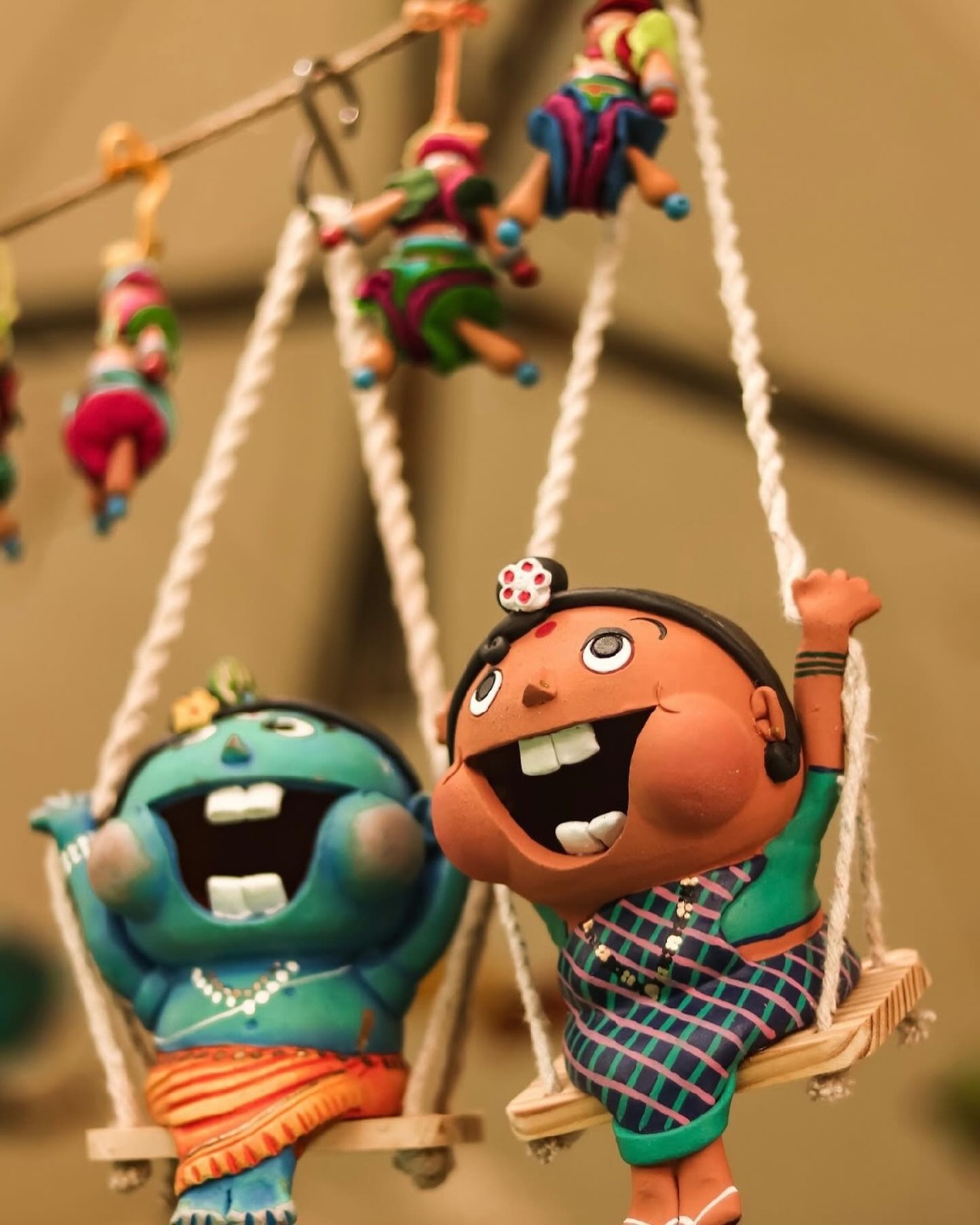By Anuradha Pati
Exhibitions offer artisans from the handmade sector – and especially traditional crafts – a platform to sell their products directly without the interference of middlemen.
They also give an opportunity for all of us to buy less, buy handmade, and support the local economy and artisanship. By doing this we also help mitigate climate change, safeguarding traditional livelihoods and saving them from extinction.
Here are some of the most renowned craft exhibitions of India that you must visit and encourage. Interestingly, many of them are led and run by women.
The Crafts Council of India
The Crafts Council of India or CCI was founded in 1964 by Kamaladevi Chattopadhyay as one of her pioneering efforts toward protecting and enhancing India’s heritage in the nation’s transition to modernity.
Inspired by the commitment of Mahatma Gandhi and Rabindranath Tagore to hand production as a catalyst for political and social emancipation – as well as her experience with national efforts at craft regeneration since Independence – Chattopadhyay wanted to mobilise public awareness and action.
Registered in Chennai with nine state councils across India, CCI works to ensure sustainable livelihoods through crafts, growth for artisans and their families through opportunities for education and training.

CCI exhibitions are much sought-after for their authenticity and are usually held for a week in their respective states. They advertise through newspaper and social media. There is no entry fee to this fabulous display by 100-odd stalls. CCI’s focus is that all of India is represented. The exhibitions also have some food stalls.
Phone: +91 (44) 2434 1456 / 2432 7931
Mobile: +91-99401-94997
Email: info@craftscouncilofindia.in
Dastkari Haat Samiti
Dastkari Haat Samiti (DHS) crafts bazaars are being held for almost 40 years all over the world. In India, the bazaar is held in Delhi, Mumbai, Pune, Hyderabad, Bangalore, Ahmedabad, Chennai, Bhopal and Chandigarh.
Founded by activist-author Jaya Jaitly in 1986, about three to four large DHS exhibitions are held every year for a duration between eight to 15 days. They mostly stick with the same venue each time, and advertise through print, electronic and social media. Except for the exhibition in Dilli Haat where there is an entry fee collected by Delhi Tourism, this exhibition is free in all other venues.
Around 100-200 stalls showcase amazing, colourful and soulful handmade products. The participants are artisans, self-help groups and NGOs, and genuine producers. No screen or digital printing is allowed and no plastic either, unless it is recycled.

DHS tries to bring new artisans every time and also prioritises artisans who don’t have any direct connection with customers. They aim is that customers should be exposed to a wide array of products. Before the pandemic struck, they used to organise international skill exchange workshops in Dilli Haat, a first-of-its-kind marketplace in Delhi created by DHS.
The exhibition hosts cultural programmes and food stalls from different states. They also organise different kinds of arts and crafts workshops so that artisans interact with children and adult customers.
Instagram: @dastkarihaatsamiti
Facebook: @dastkarihaatsamiti
A Hundred Hands
Now a decade old, A Hundred Hands (AHH) exhibition started in the backyard of two sisters, Mala and Sonia Dhawan, to support the livelihoods of artisans and entrepreneurs. Their biannual thematic exhibitions (such as floral, water, and poetry) are held in Bangalore – usually at Jayamahal Palace grounds – for a period of five days, with a nominal entry fee.
They also organise an outreach exhibition with a partner like NIFT (National Institute of Fashion Technology) in the suburbs of Bangalore. The exhibition has travelled to other cities like Mumbai, Chennai, Coimbatore, Cochin.
This exhibition showcases purely handmade products. They have a rigorous process to select participants, with a tiered system of fees and stall charges. They work with artisans on making contemporary products for younger audiences and modern homes while keeping the craft intact.

They also have a co-creation program “MeToWe” in which varied artisans come together to create something new. The exhibition allows other designers, NGOs and funding organisations to interact with the artisans and entrepreneurs and explore possibilities of sourcing and working together.
The exhibitions have food stalls, masterclasses, walk-throughs and workshops for kids and adults. AHH has so far worked with over 20,000 artisans and reached one lakh visitors.
Mobile: +91-98450-08582
Email: a100hands@gmail.com
Instagram: @ahundredhands
Facebook: @ahundredhandsngo
Dastkar
Working with over one lakh craftspeople in 25 states all over India, Dastkar organises two types of exhibitions. There is a dedicated space at Gali-E-Khaas, Andheria Modh, New Delhi, with 100 stalls where Nature Bazaars are held with a distinct theme for 12 days every month, showcasing new participants and products in tune with the festive calendars and seasons.
Cultural performances, music, craft demonstrations and workshops, food stalls with a variety of regional cuisine make the exhibition a wholesome experience.
Dastkar also travels to other cities, mostly metros, with over 160 stalls bringing together artisans from across the nation, showcasing handcrafted textiles, jewellery, home decor, accessories, and wellness products.

It is a much-recognised platform where many new products and entrepreneurs make their debut. Dastkar strives to blend tradition with innovation. Each product tells a story, crafted with care and authenticity, forging a direct connection between the artisan and the consumer.
The exhibition also includes regional delicacies, craft demonstrations, workshops and cultural performances. The annual Dastkar Bengaluru Bazaar is going on this week from May 15 – 21, 2024, at Jayamahal Palace hotel.
Instagram: @dastkar.delhi
Facebook: @Dastkarsociety
SARAS mela
Sale of Articles of Rural Artisans Society or SARAS was started in 1999 as a marketplace for textile, handicraft and handmade products made by rural artisans under the National Rural Livelihood Mission initiatives of the central government.
Besides artisans from rural areas, the exhibition has products from urban self-help groups like beaded and metal-based jewellery, and foodstuff like pickle and sweets. These exhibitions are supported by the government with subsidised travel, stall, and accommodation for the participants, which makes the products reasonably priced.
A recent SARAS mela in Bengaluru had on display cutleries made from areca nut sheath, an eco-friendly replacement for disposable plastic and thermocol plates. There were many options in cooking vessels made of iron, clay and stone vessels, textile, food, assembled jewellery and so on. No plastic was used and cloth bags were provided to all the stalls.
Participants of SARAS mela are largely women from self-help groups. They woman the stalls with dedication, without being overly competitive, and demonstrate an amazing sense of sisterhood and solidarity.
SARAS mela is advertised in the newspapers, so keep your eyes open!
GoSwadeshi
GoSwadeshi by Gocoop (pronounced go-co-op) began as an initiative to enable the digital marketing of products by handloom and handicraft cooperatives. It has since grown to become a global marketplace for handlooms and crafts of India.
They have an online ecommerce platform and also organise offline exhibitions under the brand name of GoSwadeshi. GoSwadeshi supports indigenous artisans by selecting products that are authentic, consciously curated, and deeply rooted in Indian culture.

The platform of artisans and weavers across India has helped bring 100,000+ products to 150,000+ consumers across the world. Exhibitions are held all over India – the most recent one being in Pune in May – and are announced on their website and social media.
Instagram: @letsgocoop
Pause for a Cause
Another popular exhibition-cum-sale of clothing and accessories, Pause for a Cause is organised in aid of Concern India Foundation, a registered nonprofit, public charitable trust working with the disadvantaged.
Set up in 1991, the organisation extends financial and non-financial assistance to grassroots NGOs. Through this exhibition, the organisation supports indigenous Indian heritage textiles, and natural fabrics.
It features ethnic and contemporary clothing and accessories created by talented designers and artisans from different parts of India.
The popularity of Pause for a Cause increased manifold over the years and it is now held in 11 cities. Motivated by the response, Pause for a Cause has launched several avatars including The Benares Show and The Sari Story.
Instagram: @pauseforacauseindia
Syuti Shaili
Syuti Shaili, an exhibition of handcrafted textiles and other products, is another much sought-after platform and experience. Based out of Kolkata, they organise annual exhibitions in several other cities such as Mumbai, Hyderabad, Bangalore and Chennai.
Their recent exhibition in Mumbai saw a huge turnout on both days. Their next one is slated for Bangalore on 27 – 28 July, and then in Kolkata from 29 – 31 August.
Instagram: @syutishaili
There are many more exhibitions that are organised across India. Some are local, like Bhimthadi Jatra of Pune. The Karnataka Chitrakala Parishath organises several exhibitions and has a few permanent stalls as well.
A handmade exhibition is different from a fair. The latter can sell anything from factory- and machine-made to screen-print, power loom and plastic. One way to recognise handmade products is that they can never be sold cheap unless it is a distress sale.
Craft in India, much like agriculture, depends on middlemen who provide inputs, raw material, design and market. They also give loans to the artisans, which makes it even harder for the artisan to break away from the vicious debt cycle. In such a scenario, exhibitions are significant as they empower the artisans by providing direct access to customers, which increases their confidence and ability to negotiate.
What we eat and what we wear is an act of alignment – either for a sustainable earth or crash consumerism.
Anuradha Pati has worked in the development sector in India for close to three decades on natural resource management, capacity building and rural livelihoods. She has also worked on public diplomacy and disaster response. An alumna of Tata Institute of Social Sciences now based in Bangalore, she is the recipient of a Chevening scholarship and a Fulbright fellowship. Reach her on LinkedIn, Facebook or her blog.
Lead image: Abhishek Mittal / Canva
Discover more from eShe
Subscribe to get the latest posts sent to your email.


0 comments on “Craft exhibitions across India that support artisans and the environment”